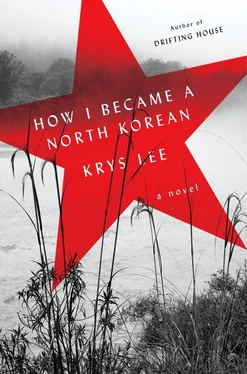Every day the computer screen lit up blue, then white, and a man glowed into focus. My first client was a man with gray hair and the face of a twenty-year-old. He didn’t waste time. As soon as he appeared on the screen, he said, “Why’s your robe on? I didn’t pay for a robe. I can go to the department store for that.”
All of them were from Nam Joseon. The Dear Leader was right about one thing: It was a nation of sick people. I kept my eyes fixed on the window to the man’s right. I told myself that the sky was still there and real, waiting for me.
I thought I would go mad. I endured. The computer’s camera followed me. I woke up to it and slept to it. Always, I felt someone watching me. I was caught inside the blank screen for all those eyes to touch. Nam Joseon men in navy suits, men in white undershirts beached in their chairs, naked men, hairy men, men with the high-pitched voices of women. Men who desired pregnant women.
Only my baby mattered. I stroked the tight drum of my stomach, the beautiful life of four months that knew nothing of this room. I pictured a curled fist of webbed fingers, a giant bean of a body, and carried love and fear inside me.
Within a few weeks I resorted to the only plan possible. I started with a man whittled down to a chopstick. My stomach had swelled and my breasts were heavier now and tender at their tips. The man shyly sneaked looks at me, this shell in which I was protecting two beating hearts, and said, “You could be a pregnant schoolgirl.”
He was old enough to have a daughter in school. I missed Eomma. I kept one leg up, one arm curved across my waist.
“Is that what you like, pregnant schoolgirls?”
I slipped off the robe.
He nodded and rambled on nervously. “Women are too skinny these days. It’s all that dieting. If you eat tomatoes all day, it’s a tomato diet. Watermelons, a watermelon diet.”
“What’s a diet?”
He laughed and explained dieting to me. The concept was shocking. But Nam Joseon was also a country with more cars than bicycles, where people freely traveled without punishment. It wasn’t real to me yet, but I knew it was a safe country where a future was possible. Though its people were sick, I wanted to go there.
“Help me,” I said finally to him, as I would to each of my men, and waited for his response.
One of the girls slit her slender wrist with a shard of mirror. The ajumma took our mirrors away. One moved like a broken ox. One girl wrapped herself in a padded coat that hid her body of fish bones whenever the ajumma allowed us to pace the halls. My memory comes in fragments. Nothing is chronological. In my sleep I walked through the paint-peeled walls of our underground fortress, out into the white sunlight and back across the frozen river toward home. When the girl used the mirror on herself, I thought it could have been me. Maybe it was the end of my second month — or the third? — when the man I had waited for arrived.
I glimpsed a faint gold cross hanging on the wall behind him, took the risk, and told him where I was from. He viewed me calmly from his leather chair, as if he had already known before he called. The man I would later call Missionary Kwon fixed his gaze on me until I — even I! — had to look away.
Finally he said, “I’m a powerful man. I can do anything. I could buy your freedom for you.”
I looked behind me, but of course there was only a wall.
“Why would you do that for me? You don’t know me.”
I didn’t really believe this. A man would do many things for a stranger if she was young and beautiful enough.
“You’re not the first group of girls I’ve found this way. I’ve raised enough money this time to get many of you out.”
He settled back into the chair that rose with imperial gravity behind him. His frozen face looked incapable of expression.
I tried to hide my excitement. “What do you want from me?”
“What could you possibly give me that I would want?” He thought about it for a moment, then said, “Take off your clothes, in case there’s trouble.”
I jerked the cord loose and let the robe fall, surrounding me in a sea of scarlet. His gaze remained steady despite my ripe shape. He didn’t seem particularly interested, at least not in the way I was used to. I felt desperate for his attention — to use my little power not to become a pregnant woman sent back across the river with a baby believed to be Chinese-born, of impure blood.
He said, “Why did you cross?”
His question cornered me. “Who are you, really?”
He wagged a finger at me. “I’m here to help you. Are you always so suspicious?”
I crossed my legs. “I have no reason to trust you.”
His image wavered on the screen, then steadied again. “Do you have a choice?”
Of course I didn’t.
“How long have they held you?”
“Someone could be listening.”
“The server’s routed through South Korea — what your people call Nam Joseon.”
“How do you know?”
“It’s my job to know these things. So? Your crossing? There are people who need to know these things before I can do anything for you.”
It didn’t matter which side of the river I was on. Men asked the questions and women answered. Maybe that is all power is: the right to demand and expect answers. But before I learned what he could do for me, I heard someone at the door and the man ended the video call.
Sometime after the third meal that divided our day, the man called again.
I spoke rapidly this time, mostly telling the truth. The person I exaggerated for him was pathetic and needy, though my real situation was desperate enough without my flourishes. Wasn’t he allured, moved by pity? Convinced I was worth saving? He rubbed his chin with his bony fingers, listening patiently but wearily. Nothing I said seemed to shock or interest him. I kept talking, my underarms dampened with sweat.
“That’s enough.” He aimed his gold-tipped pen at the screen. “I understand the situation.”
“Help me, please. I don’t have much time.”
His distant, sympathetic gaze traveled down my body, then back up. “I know.”
“I’ll pray every night for your help.” I said this too hurriedly; it made me sound insincere.
“You shouldn’t be ashamed,” he said when I wrapped the robe tightly around me. “You’re a beautiful woman. A woman’s body is one of God’s most beautiful creations.”
I watched his interest lift and fall. Lift, fall. I didn’t know how to read him.
• • •
One day we were lined up in the corridor, arms raised above our heads and legs fanned out, toes touching the toes of the next person. Our bodies merged into one as the ajumma ’s hand traveled up our robes. It moved vigilantly across every part of our bodies, looking for a weapon. How different my life had become: so specific, so small.
“A set of chopsticks has disappeared,” said the madam. “Before you hurt yourself and create a mess for others, you may as well turn it in.” She marched up and down past the dozen of us.
Utensils disappeared, so we began eating rice and kimchi with our hands and drank our soup straight from plastic bowls. Sometimes a piece of kimchi or a spoonful of savory dwenjang helped me escape. One bite, and I was back at home, in my village, past the checkpoint and through the concrete walls surrounding our grid of houses. It was winter, and the walls were heavy with drifts of glittering snow. My nose burned from the cold, but there was a fire going in Eomma’s kitchen. I was finally safe, near the warming flames. As Eomma stirred a pot over the burning agungi, making bean curd to sell at the market, I touched her broad back.
Eomma, I said, I’m finally home. Eomma turned and I saw that it wasn’t her at all, but a man from the Ministry of People’s Security in my eomma ’s navy dress who struck me on the head with the boiling cast-iron pot.
Читать дальше












